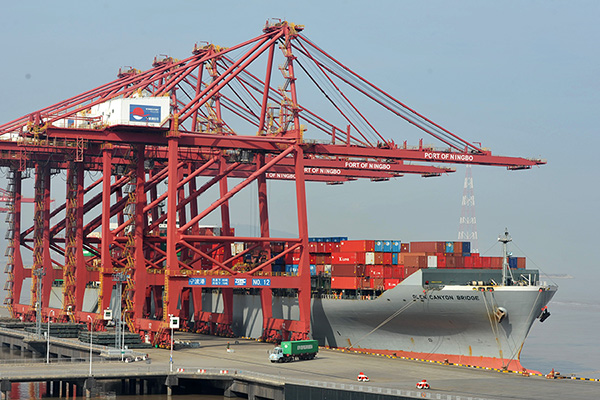 |
|
A container ship docks at the Port of Ningbo, East China's Zhenjiang province. [Photo/Xinhua] |
BEIJING - China's foreign trade improved markedly in August over stronger domestic and external demand, customs data showed Thursday.
Exports in yuan-denominated terms rose 5.9 percent year on year in August, accelerating from 2.9 percent in July. Imports increased 10.8 percent, compared with a decline of 5.7 percent, according to figures from the General Administration of Customs (GAC).
That led to a monthly trade surplus of 346 billion yuan ($51.9 billion), down 5.1 percent from a year earlier.
A leading index for export outlook rose 0.9 points from July to 34.7 points, signaling reduced pressure on export growth in the fourth quarter of 2016, said the GAC.
Exports turned out better than expected in August as overseas demand stabilized to some extent, investment bank China International Capital Corp. (CICC) said in a research note, citing rebounding manufacturing activity in the United Kingdom and improved job data in the United States.
In addition, depreciation of the yuan also helped lift exports, said Li Jian, a researcher with the Chinese Academy of International Trade and Economic Cooperation.
"The slow recovery in foreign trade will extend over the rest of the year," he said.
In U.S. dollars, exports slipped 2.8 percent year on year, better than a 4-percent drop expected by the market and a 4.4-percent decline recorded in July.
Imports in dollar terms rose 1.5 percent year on year in August, the first positive reading in well over a year.
HSBC economist Julia Wang said the import growth was a big surprise, noting that the domestic demand rebound was likely a result of infrastructure investment growth over the past few months.
The improvement came after an official survey last week pointed to expanding factory activity due to a recovery in market demand and a rebound in production.
The purchasing managers' index (PMI) came in at 50.4 in August, rising from 49.9 in July and beating market expectation of 49.8, according to the National Bureau of Statistics and the China Federation of Logistics and Purchasing.
Soft global demand and industrial overcapacity have weighed on China's economy in the past quarters, with GDP growing 6.7 percent in the second quarter of 2016, the lowest quarterly level since the global financial crisis in early 2009.
Policy makers have revved up infrastructure investment, encouraged innovation and pushed forward supply-side reform to sustain economic growth.
Wang expects fiscal policy to remain expansionary in the second half of 2016 and offset weakness elsewhere in the economy.
The trajectory of import growth and the shape of domestic demand will ultimately depend on the pace of fiscal expansion, Wang said.
Meanwhile, the CICC predicted both import and export growth to slow in September due to public holidays.
In the first eight months, foreign trade was down 1.8 percent from a year earlier, with exports dropping 1 percent and imports falling 2.9 percent, GAC data showed.
Trade surplus for the first eight months widened 5 percent from a year earlier to 2.31 trillion yuan.
Foreign trade with the European Union, China's biggest trade partner, climbed 3.5 percent year on year in the first eight months. Trade with the United States, China's second-biggest trade partner, fell 3.2 percent, and that with ASEAN, its third-largest trade partner, declined 1.1 percent.
In the same period, China's iron ore imports rose 9.3 percent by volume, while that of crude oil and coal surged 13.5 percent and 12.4 percent, respectively.
